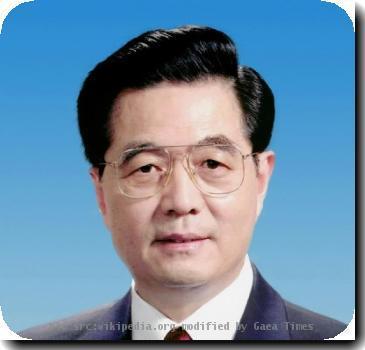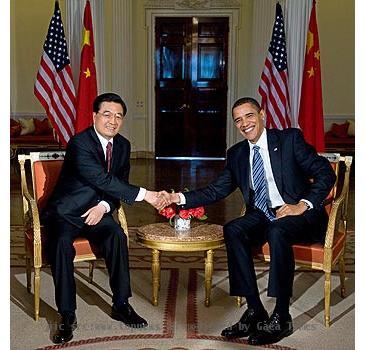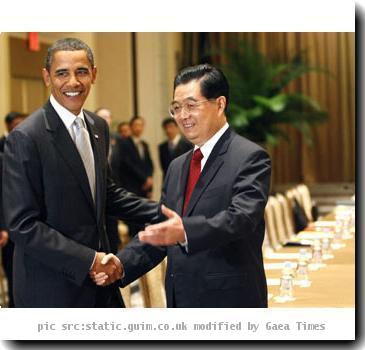North Korea confirms secretive leader Kim Jong Il’s made ‘unofficial’ visit to China
By Christopher Bodeen, APThursday, May 6, 2010
North Korea confirms Kim’s visit to China
BEIJING — After days of secrecy, North Korean media confirmed Friday that the country’s reclusive leader Kim Jong Il visited China, but made no mention of expected economic agreements or a possible commitment by the North to return to nuclear talks.
This week’s visit could potentially kick-start the process of North Korea dismantling its nuclear programs, although there was no immediate word on whether Kim had offered any such pledge to China, his impoverished and isolated regime’s most important ally.
The Korean Central News agency said in a dispatch from Pyongyang that Kim made the “unofficial” visit starting Monday and ending Friday. The trip had been shrouded in secrecy, with no previous confirmation of it by China or North Korea or their official media, even though Kim was seen in China by journalists several times.
KCNA reported that the visit was finished, although South Korea’s Yonhap news agency said Kim’s armored train had yet to cross the border at the Chinese Yalu river town of Dandong.
KCNA made no mention of a one-on-one meeting with Chinese President Hu Jintao — as had been reported by South Korean media — or even a visit to Beijing, where Kim’s motorcade was seen Wednesday and Thursday. It’s description of the visit as unofficial appeared to be an explanation for the lack of formal protocol such as an official welcoming ceremony or the flying of North Korean flags in Beijing’s Tiananmen Square.
While Kim has grown ever more dependent on Chinese aid and diplomatic support, Beijing appears determined to do what it takes to prevent his regime’s implosion and the potential political chaos that could bring severe unrest to its border regions.
Kim met with Hu on Wednesday night and with Premier Wen Jiabao and other officials on Thursday, according to reports in South Korean media, which closely followed the visit.
The KCNA report said Kim toured the northeastern cities of Dalian and Tianjin and met with vice premier Li Keqiang and other officials.
“The leader of the DPRK received a sincere and warm welcome from Chinese people wherever he went in China,” the KCNA report said. “Kim Jong Il expressed satisfaction over the result of his visit.”
This week’s visit was Kim’s fifth to China since succeeding his father as ruler in 1994, with the last in 2006.
Ailing from what was believed to have been a stroke in 2008, Kim, 68, is rarely seen in public and is surrounded by tight security at all times.
South Korea’s Yonhap news agency reported that Kim told Hu he is ready to return to six-nation denuclearization talks, but it gave no details. Kim has said the same thing in the past, but usually with attached conditions, such as a long-sought direct dialogue with the United States. Yonhap did not say what, if any, conditions he set this time.
Scholars have said they expected Kim to express some new willingness to rejoin the long-stalled China-sponsored negotiations, under which North Korea agreed to dismantle its nuclear programs in return for aid.
North Korea quit the talks a year ago and then conducted a nuclear test that drew tightened U.N. sanctions. The last round of the talks — involving China, Russia, the two Koreas, Japan and the U.S. — was held in December 2008.
Although China is unlikely to link them explicitly, a return to the talks is likely to go hand-in-hand with new aid, including the implementation of economic agreements reached during a visit by Wen to North Korea last year.
China, which sent troops to back North Korea during the 1950-53 Korean War, already provides the bulk of its food and fuel aid to feed its malnourished population of 23 million and prop up an economy devastated by natural disasters and chaotic management — most recently a currency revaluation that backfired disastrously.
Beijing’s support for Kim is driven overwhelmingly by its own security concerns, which override any unhappiness it might have over North Korea’s nuclear program or rejection of economic reforms, Chinese scholars say.
“No matter how different its opinions are from those of the North Koreans, and how much unhappiness it has toward them, the Chinese government will not leave North Korea to implode, and it will not let the strategic balance of the Korean peninsula be broken,” said Cai Jian, deputy director of the Center for Korean Studies in Shanghai’s Fudan University.
That, however, comes at the risk of upsetting South Korea, where suspicion is rising that a North Korean torpedo destroyed the naval ship Cheonan in March, killing 46 sailors. North Korea has denied involvement.
The timing of Kim’s China visit has aroused some complaints among South Korean politicians, who say it shows insensitivity toward the Cheonan victims. South Korean officials have asked that China play a “responsible role” in the aftermath of the sinking and keep them informed of Kim’s activities in China.
Associated Press Writers Kwang-tae Kim and Jean Lee in Seoul and researcher Zhao Liang in Beijing contributed to this report.
Tags: Asia, Beijing, China, East Asia, Greater China, Hu Jintao, North Korea, South Korea


